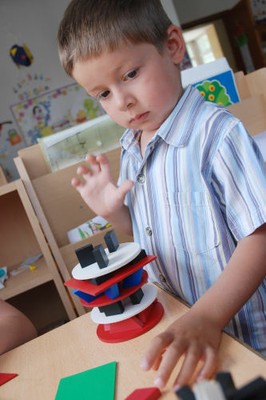SOS Schools in Georgia
SOS Nursery School Kutaisi
For the time being, 7 children – 4 boys and 3 girls - of SOS Children’s Village Kutaisi go to Kutaisi Nursery School #1. There are groups operating under the Step-by-step Development Programme. It is one of the best nursery schools in the city.
The Step-by-step Development Programme drastically changed the educational environment. Children are always active and energetic. They develop in accordance with the programme. The number of applicants has increased and that is caused by the implementation of activities stipulated for in the Step-by-step Development Programme.
The SOS Children’s Village purchased fire-wood, paints and other repair materials for Nursery School #1. SOS Children’s Village finances the provision of food to 150 children of the commune. 9 groups of Step-by-step development programme were repaired in compliance with European standards. Teachers had training courses.
Parents of those children are very happy. They thank SOS Children for care and support provided by it to their children.
Levan Baliashvili
Director SOS Children’s Village Kutaisi
SOS Nursery School Tbilisi
The SOS Nursery School is designed for 95 foster-children. 91 children went to the nursery school in 2008. Under the Family Strengthening Programme, 11 children go to nursery school (4 more children will be added). There are 5 age groups in the nursery school: two for the age under 5-6 years, one for the age under 4-5 and two for the age under 3-4 years. This year, 27 children left from the nursery school and went to school.
Apart from those children living in the children’s village as well as those participating in the Family Strengthening Programme, the Nursery School serves neighbouring population of various groups.
In August, the SOS Nursery School Tbilisi gave shelter and rendered assistance to the outcast families from the Shida-Kartli region. 34 people lived in the nursery school and got assistance for two weeks.
From 2008, the SOS Nursery School started to be partially self-financing. Some benefits were provided to socially unprotected families. As the number of children increased, one more teacher on the staff was selected through the tender.
Furthermore, two more teachers were selected through the tender due to outflow of personnel. The selected teachers were delivered an orientation programme.
In the accounting period, a teaching and educational process was being planned. Thematic teaching, methods of teaching introduced in the Nursery school supports a child’s individual development. The rooms are divided into activity centres to help children work both individually and in small groups. Teachers keep records of observation as well as individual plans of working with children considering their interests and potentials. Children are assessed twice a year – in May and in December.
A readiness-for-school assessment system was successfully implemented in June for school-aged children. To celebrate the end of the academic year, theatrical performances were held in the SOS Nursery School. The SOS Nursery School’s service packet was extended as children started learning English. The English language is taught by a teacher of the SOS Nursery School who was delegated such a mission on and children also learn Russian. A pleasing and safe environment, step-by-step teaching methods and highly skilled teachers ensure a high level of children development.
Gulnaz Khutsishvili, Director of SOS Nursery School Tbilisi

 Return to Schools Wikipedia Home page…
Return to Schools Wikipedia Home page…
